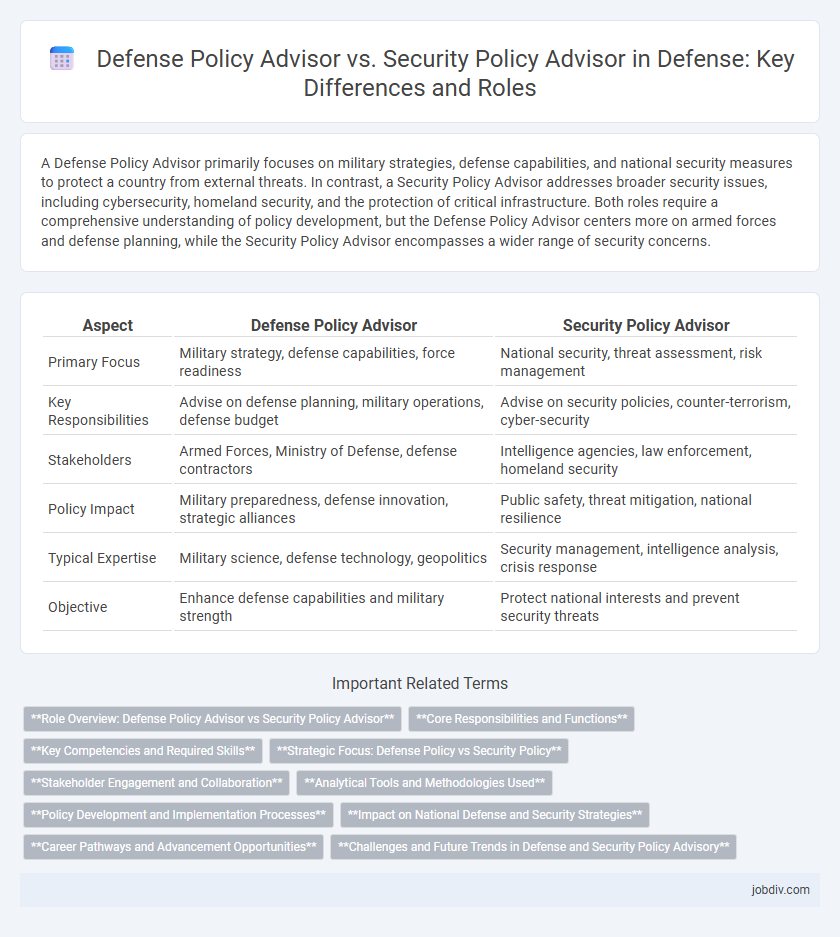A Defense Policy Advisor primarily focuses on military strategies, defense capabilities, and national security measures to protect a country from external threats. In contrast, a Security Policy Advisor addresses broader security issues, including cybersecurity, homeland security, and the protection of critical infrastructure. Both roles require a comprehensive understanding of policy development, but the Defense Policy Advisor centers more on armed forces and defense planning, while the Security Policy Advisor encompasses a wider range of security concerns.
Table of Comparison
| Aspect | Defense Policy Advisor | Security Policy Advisor |
|---|---|---|
| Primary Focus | Military strategy, defense capabilities, force readiness | National security, threat assessment, risk management |
| Key Responsibilities | Advise on defense planning, military operations, defense budget | Advise on security policies, counter-terrorism, cyber-security |
| Stakeholders | Armed Forces, Ministry of Defense, defense contractors | Intelligence agencies, law enforcement, homeland security |
| Policy Impact | Military preparedness, defense innovation, strategic alliances | Public safety, threat mitigation, national resilience |
| Typical Expertise | Military science, defense technology, geopolitics | Security management, intelligence analysis, crisis response |
| Objective | Enhance defense capabilities and military strength | Protect national interests and prevent security threats |
Role Overview: Defense Policy Advisor vs Security Policy Advisor
A Defense Policy Advisor specializes in formulating and analyzing military strategies, defense resource allocation, and national defense priorities to support government decisions. In contrast, a Security Policy Advisor focuses on broader national security issues, including threat assessment, cybersecurity, counterterrorism, and public safety policies. Both roles require strategic planning and risk management but differ in scope, with defense advisors centering on military capabilities and security advisors addressing comprehensive security frameworks.
Core Responsibilities and Functions
A Defense Policy Advisor primarily focuses on shaping military strategies, defense resource allocation, and force readiness to support national defense objectives. In contrast, a Security Policy Advisor specializes in broader security issues such as intelligence analysis, threat assessment, and the development of policies related to homeland and cyber security. Both roles require collaboration with government agencies but differ in scope, with Defense Advisors concentrating on armed forces and Security Advisors addressing multifaceted security challenges.
Key Competencies and Required Skills
Defense Policy Advisors demonstrate expertise in military strategy, threat assessment, and defense resource allocation, emphasizing analytical skills and knowledge of international security frameworks. Security Policy Advisors specialize in risk management, cybersecurity protocols, and intelligence analysis, requiring proficiency in security technologies and regulatory compliance. Both roles demand strong communication abilities, policy development experience, and an understanding of geopolitical dynamics, but defense advisors tend to focus more on operational military considerations while security advisors prioritize protective measures and technology-driven security solutions.
Strategic Focus: Defense Policy vs Security Policy
Defense Policy Advisors concentrate on military capabilities, force posture, and defense budgets to ensure national defense readiness against external threats. Security Policy Advisors emphasize broader issues including cybersecurity, counterterrorism, and intelligence collaboration to address both internal and external security challenges. The strategic focus of Defense Policy is primarily on defense mechanisms and military strategy, while Security Policy encompasses a wider spectrum of political, economic, and social factors affecting national stability.
Stakeholder Engagement and Collaboration
Defense Policy Advisors specialize in engaging military leaders, defense agencies, and international security organizations to align strategic objectives and operational priorities. Security Policy Advisors focus on collaborating with intelligence agencies, law enforcement, and cybersecurity experts to address threats and implement protective measures. Both roles require effective stakeholder engagement to ensure cohesive policy development and coordinated responses to emerging security challenges.
Analytical Tools and Methodologies Used
Defense Policy Advisors utilize advanced strategic modeling software, risk assessment frameworks, and military simulations to evaluate potential defense outcomes and resource allocations. Security Policy Advisors rely heavily on threat analysis tools, cybersecurity analytics platforms, and intelligence fusion methodologies to assess vulnerabilities and design protective measures. Both roles incorporate data-driven decision-making, but Defense Advisors focus more on operational readiness while Security Advisors emphasize threat mitigation.
Policy Development and Implementation Processes
Defense Policy Advisors concentrate on creating and executing strategies that address military readiness, force structure, and national defense priorities, ensuring alignment with broader governmental defense objectives. Security Policy Advisors focus on developing policies related to internal security, counterterrorism, and intelligence, emphasizing coordination between agencies to safeguard national security. Both roles require analyzing geopolitical threats and advising senior leadership on policy adaptation to evolving security environments.
Impact on National Defense and Security Strategies
Defense Policy Advisors shape military strategy and force readiness by integrating defense capabilities with geopolitical threats, directly influencing national defense priorities and resource allocation. Security Policy Advisors focus on broader security issues including cybersecurity, counterterrorism, and intelligence coordination, enhancing national security frameworks and crisis response mechanisms. Both roles collaborate to ensure cohesive policies that balance immediate defense needs with long-term security objectives.
Career Pathways and Advancement Opportunities
Defense Policy Advisors typically advance through roles in military strategy, national security agencies, or defense departments, gaining expertise in defense planning and international security frameworks. Security Policy Advisors often progress within intelligence communities, homeland security, or cybersecurity sectors, focusing on threat assessment and protective measures. Both career paths offer upward mobility into senior advisory positions, government leadership roles, or specialized consultancy opportunities, driven by experience in policy analysis, strategic planning, and interagency coordination.
Challenges and Future Trends in Defense and Security Policy Advisory
Defense policy advisors face challenges in integrating emerging technologies such as artificial intelligence and cyber capabilities into traditional military strategies, requiring adaptive frameworks to address evolving threats. Security policy advisors must navigate complex geopolitical tensions and asymmetric threats, emphasizing the need for dynamic risk assessment and interagency collaboration to enhance national resilience. Future trends indicate increased reliance on data analytics and interdisciplinary expertise to formulate agile policies that balance defense imperatives with global security considerations.
Defense Policy Advisor vs Security Policy Advisor Infographic

 jobdiv.com
jobdiv.com